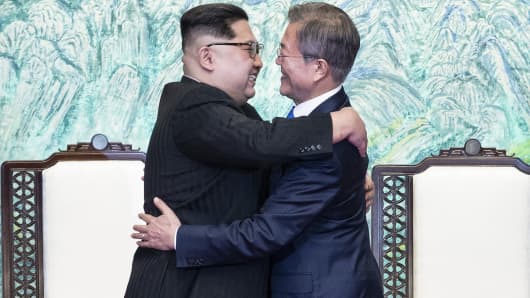This may be a good time for President Trump and the U.S. to get out of the way and let the two sides of the DMZ try to work things out by themselves. It may sound like a risky approach at first blush. But it is worth thinking about whether such an approach might ultimately be less risky and more successful than one based on continuing deep U.S. engagement.
Under President Trump, the U.S. has careened in recent month from nuclear saber-rattling about "fire and fury" to suddenly jumping at the prospect of a summit meeting with the "honorable" Mr. Kim. Aside from subjecting our allies to strategic whiplash with our dramatic change of strategic and diplomatic course, both of these approaches by themselves pose their own risks.
The clear and present danger of the former is nuclear war, or at least perilous conventional conflict. Conversely, the president's new-found enthusiasm for bilateral diplomacy with Kim risks the United States getting suckered into a fruitless series of negotiations (keep in mind that the peace negotiations at Panmunjon have been dragging on for 65 years!) that might result in an even "badder" deal than his predecessor signed with Iran or forcing him to storm out of the negotiations in a huff. Neither would be a good outcome.
Admittedly, adopting a more restrained diplomatic posture is not without risk as well. There is a short-term risk that Kim will exploit his southern counterpart's peace offensive and leave President Moon with egg on his face. But better him than the leader of the free world.
We should keep in mind that such an approach also poses risks for Kim. The first fan of Dennis Rodman sits atop a brittle autocracy that likely cannot survive more open relations with the South over the longer term.
During the Détente period, many hawks advocated keeping diplomatic and cultural relations between East and West in the deep freeze. While they were right that containment of communism required a military sword and shield, what finally brought communism down was the power of the appeal of freedom, which greater diplomatic and cultural contact amplified.
And what if the negotiations between the two sides got so serious that Kim offered to denuclearize in exchange for the withdrawal of U.S. forces from the Peninsula? That might not be such a bad deal either.
Despite its advantages in number of troops (many of them under-armed and malnourished) and artillery, the North has no real ability to fight and win a war against the South, though it could surely cause a lot of damage in a lost war.
Even without U.S. ground forces, which by the way we have considered unilaterally withdrawing on occasion over the years, the most timely and effective contribution America could make to South Korea's defense is air power which could be called in quickly from U.S. bases elsewhere in the region.
Critics will reasonably object that such an American approach in which we in essence hold both sides' coats in not without risks. But they ignore the risks of deeper U.S. involvement. This might be a time in which the risks of a adopting a lower American profile are worth taking and letting the Koreans take the lead to try to work things out.
Commentary by Michael Desch, a professor of political science at Notre Dame and director of the Notre Dame International Security Center. He is co-author of the book "Privileged and Confidential: The Secret History of the President's Foreign Intelligence Advisory Board" with K. Michael Absher and Roman Popadiuk. Follow him on Twitter @mcdesch.
For more insight from CNBC contributors, follow
@CNBCopinion
on Twitter.


